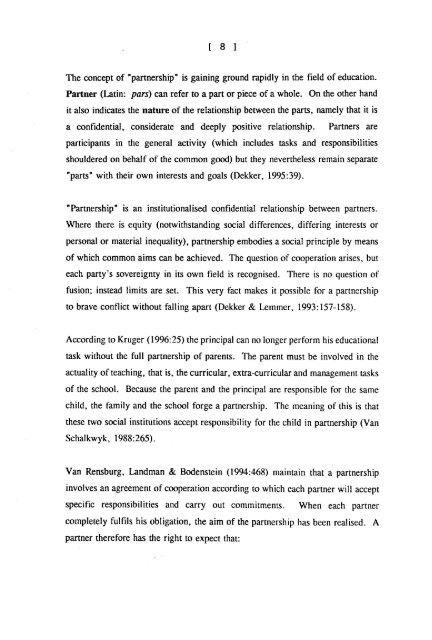parents and principals as partners in creating a culture of learning
parents and principals as partners in creating a culture of learning
parents and principals as partners in creating a culture of learning
Create successful ePaper yourself
Turn your PDF publications into a flip-book with our unique Google optimized e-Paper software.
[ 8 1<br />
The concept <strong>of</strong> '<strong>partners</strong>hip' is ga<strong>in</strong><strong>in</strong>g ground rapidly <strong>in</strong> the field <strong>of</strong> education.<br />
Partner (Lat<strong>in</strong>: pars) can refer to a part or piece <strong>of</strong> a whole. On the other h<strong>and</strong><br />
it also <strong>in</strong>dicates the nature <strong>of</strong> the relationship between the parts, namely that it is<br />
a confidential, considerate <strong>and</strong> deeply positive relationship. Partners are<br />
participants <strong>in</strong> the general activity (which <strong>in</strong>cludes t<strong>as</strong>ks <strong>and</strong> responsibilities<br />
shouldered on behalf <strong>of</strong> the common good) but they nevertheless rema<strong>in</strong> separate<br />
'parts' with their own <strong>in</strong>terests <strong>and</strong> goals (Dekker, 1995:39).<br />
'Partnership' is an <strong>in</strong>stitutionalised confidential relationship between <strong>partners</strong>.<br />
Where there is equity (notwithst<strong>and</strong><strong>in</strong>g social differences, differ<strong>in</strong>g <strong>in</strong>terests or<br />
personal or material <strong>in</strong>equality), <strong>partners</strong>hip embodies a social pr<strong>in</strong>ciple by means<br />
<strong>of</strong> which common aims can be achieved. The question <strong>of</strong> cooperation arises, but<br />
each party's sovereignty <strong>in</strong> its own field is recognised. There is no question <strong>of</strong><br />
fusion; <strong>in</strong>stead limits are set. This very fact makes it possible for a <strong>partners</strong>hip<br />
to brave conflict without fall<strong>in</strong>g apart (Dekker & Lemmer, 1993: 157-158).<br />
Accord<strong>in</strong>g to Kruger (1996:25) the pr<strong>in</strong>cipal can no longer perform his educational<br />
t<strong>as</strong>k without the full <strong>partners</strong>hip <strong>of</strong> <strong>parents</strong>. The parent must be <strong>in</strong>volved <strong>in</strong> the<br />
actuality <strong>of</strong>teach<strong>in</strong>g, that is, the curricular, extra-curricular <strong>and</strong> management t<strong>as</strong>ks<br />
<strong>of</strong> the school. Because the parent <strong>and</strong> the pr<strong>in</strong>cipal are responsible for the same<br />
child, the family <strong>and</strong> the school forge a <strong>partners</strong>hip. The mean<strong>in</strong>g <strong>of</strong> this is that<br />
these two social <strong>in</strong>stitutions accept responsibility for the child <strong>in</strong> <strong>partners</strong>hip (Van<br />
Schalkwyk, 1988:265).<br />
Van Rensburg, L<strong>and</strong>man & Bodenste<strong>in</strong> (1994:468) ma<strong>in</strong>ta<strong>in</strong> that a <strong>partners</strong>hip<br />
<strong>in</strong>volves an agreement <strong>of</strong> cooperation accord<strong>in</strong>g to which each partner will accept<br />
specific responsibilities <strong>and</strong> carry out commitments. When each partner<br />
completely fulfils his obligation, the aim <strong>of</strong> the <strong>partners</strong>hip h<strong>as</strong> been realised. A<br />
partner therefore h<strong>as</strong> the right to expect that:

















